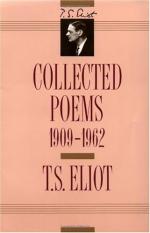|
This section contains 958 words (approx. 4 pages at 300 words per page) |

|
[The] war book above all others in the 'twenties was The Waste Land, and no account of the forces that formed the 'thirties generation would be accurate that neglected that powerfully influential poem. Eliot had an acute sense of what he called 'the immense panorama of futility and anarchy that is contemporary history', and he put that sense of history into his poem. And in 1922 contemporary history meant vestiges of the war: hence the two veterans who meet in the first part, and Lil's husband, who has just been demobbed, in the second, and the shouting and crying in part five, which Eliot's note identifies with the Russian Revolution. But beyond that, the world of the poem, with its heaps of broken images and its shocked and passive and neurasthenic persons, is a paradigm of war's effects, and of a world emptied of order and meaning, like a...
|
This section contains 958 words (approx. 4 pages at 300 words per page) |

|


